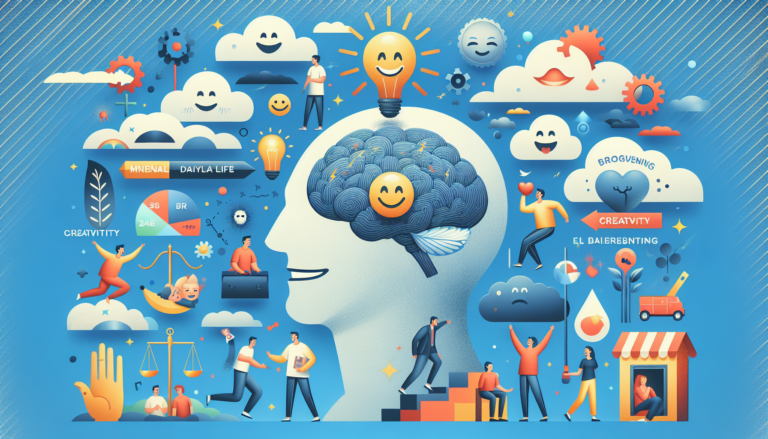A Beginner’s Guide To Developing Resilience
If you’ve ever wondered how some people seem to bounce back from challenges with ease while others get overwhelmed, fret not! This Beginner’s Guide to Developing Resilience is here to help you understand and cultivate your own inner strength. Resilience is not an innate trait, but rather a skill that can be learned and nurtured. Dive into this article to discover practical tips and strategies that will empower you to navigate life’s ups and downs with a newfound sense of resilience. Get ready to embrace the hurdles, because you’ve got what it takes to thrive!

Understanding Resilience
Definition of resilience
Resilience can be defined as the capacity to bounce back from challenges, setbacks, and adversity. It is the ability to adapt, learn, and grow in the face of difficulties. Resilience involves having a positive mindset, a strong sense of self, and the ability to manage stress effectively.
Importance of developing resilience
Developing resilience is crucial for leading a healthy and fulfilling life. It enables you to navigate through the ups and downs of life with grace and perseverance. Resilience helps you bounce back from failures, overcome obstacles, and maintain a sense of optimism and hope. It equips you with the skills and mindset needed to handle stress, maintain healthy relationships, and achieve personal and professional success.
Factors that contribute to resilience
Several factors can contribute to the development of resilience. Supportive and nurturing relationships play a crucial role, as having a strong support network can provide emotional support and encouragement. Self-awareness is also essential, as it allows you to understand your strengths and weaknesses and develop strategies to cope with challenges. Positive self-talk, cultivating a growth mindset, and building emotional intelligence are other factors that contribute to resilience.
Recognizing the Need for Resilience
Identifying challenges and setbacks
The first step in developing resilience is recognizing the challenges and setbacks you may encounter in life. These can include personal or professional failures, relationship difficulties, health issues, or financial struggles. By acknowledging these challenges, you can begin to develop strategies to overcome them and build resilience.
Understanding the impact of stress
Stress can have a significant impact on your ability to cope with challenges and setbacks. It can affect your physical and mental well-being, making it difficult to bounce back from adversity. Understanding the impact of stress on your body and mind is crucial for developing resilience. By managing stress effectively, you can enhance your resilience and ability to navigate through difficult times.
Realizing the benefits of resilience
Developing resilience brings numerous benefits to your life. It allows you to maintain a positive outlook, even in the face of adversity. Resilience helps you develop problem-solving skills, adapt to change, and learn from failures. It also enables you to build strong relationships and maintain overall well-being. Realizing these benefits can serve as motivation to actively develop resilience.
Building a Resilient Mindset
Developing self-awareness
Self-awareness is a crucial aspect of building a resilient mindset. By understanding your strengths, weaknesses, and emotions, you can develop strategies to navigate through challenges effectively. Reflect on your values, beliefs, and personal goals to gain clarity and self-understanding. This will enable you to develop resilience in alignment with your core self.
Practicing positive self-talk
Positive self-talk involves consciously replacing negative thoughts with positive and encouraging ones. The way you speak to yourself has a significant impact on your resilience. By using positive self-talk, you can boost your confidence, maintain a positive outlook, and navigate through setbacks with resilience.
Cultivating a growth mindset
A growth mindset is the belief that abilities and qualities can be developed and improved through effort, practice, and learning. Embracing a growth mindset allows you to view challenges as opportunities for growth and learning. By recognizing that failures and setbacks are part of the journey, you can bounce back and develop resilience.
Building emotional intelligence
Emotional intelligence refers to the ability to recognize, understand, and manage your own emotions and the emotions of others. Developing emotional intelligence enhances your resilience by allowing you to regulate your emotions effectively, navigate through difficult situations, and build strong relationships. Practice empathy, active listening, and self-reflection to strengthen your emotional intelligence.
Developing Emotional Resilience
Understanding emotions and their role in resilience
Emotions play a crucial role in resilience. It is essential to understand and acknowledge your emotions, as they can provide valuable insights into your thoughts and reactions. Recognize that experiencing a range of emotions is normal and allow yourself to feel them without judgment. This understanding helps you build emotional resilience.
Managing and regulating emotions
Managing and regulating emotions is an important skill to develop resilience. Practice techniques such as deep breathing, mindfulness, and reframing negative thoughts to regulate your emotions. By maintaining emotional balance, you can navigate through challenges with clarity and resilience.
Developing coping strategies
Coping strategies are techniques or actions that help you manage stress and overcome challenges. Identify healthy coping strategies that work for you, such as exercise, journaling, or talking to a supportive friend. By developing effective coping strategies, you can enhance your emotional resilience and ability to bounce back from adversity.
Practicing mindfulness and self-care
Mindfulness involves being present in the moment, observing your thoughts and emotions without judgment. Incorporate mindfulness practices into your daily routine, such as meditation or mindful breathing exercises. Additionally, prioritize self-care activities that nurture your physical, mental, and emotional well-being. Taking care of yourself is essential for developing and maintaining emotional resilience.

Strengthening Social Support
Building a strong support network
Having a strong support network is vital for developing resilience. Surround yourself with people who uplift and support you. Cultivate relationships with friends, family members, mentors, and colleagues who provide emotional support, encouragement, and guidance. A strong support network can provide a sense of belonging and comfort during challenging times.
Seeking and offering help
Developing resilience involves both seeking and offering help. Reach out to others when you need support, guidance, or a listening ear. Similarly, be open to helping others when they reach out to you. By extending a helping hand, you cultivate a sense of purpose, strengthen connections, and contribute to building a resilient community.
Nurturing healthy relationships
Healthy relationships are fundamental to resilience. Nurture and invest in relationships that are positive, respectful, and mutually supportive. Surround yourself with people who inspire you, challenge you to grow, and celebrate your successes. Healthy relationships serve as a source of strength and resilience during difficult times.
Joining support groups or communities
Support groups or communities can provide valuable resources and support during challenging times. Look for community organizations or online groups that align with your interests, challenges, or experiences. By joining such groups, you can share your experiences, gain insights from others, and build resilience collectively.
Practicing Adaptability
Embracing change
Adaptability is the ability to adjust and thrive in the face of change. Embracing change and viewing it as an opportunity for growth is crucial for developing resilience. Accept that change is a natural part of life and focus on building skills and mindsets that help you adapt and thrive in new circumstances.
Developing problem-solving skills
Problem-solving skills are essential for resilience. By developing the ability to analyze challenges, brainstorm solutions, and implement effective strategies, you become better equipped to navigate through difficult situations. Embrace a proactive approach to problem-solving and view obstacles as opportunities to learn and grow.
Flexibility and adaptability
Flexibility and adaptability go hand in hand with resilience. Cultivate a flexible mindset that allows you to adjust your plans, expectations, and goals when necessary. Recognize that things may not always go as planned but that you have the ability to adapt and find alternate paths to reach your desired outcomes.
Learning from failure
Failure is an inevitable part of life, but it does not define your resilience. Instead of dwelling on past failures, focus on learning from them. Analyze the lessons gained from setbacks, adjust your strategies, and move forward with resilience and determination. Failure can be a stepping stone to success if you approach it with a growth mindset.
Resilience in the Face of Adversity
Accepting and reframing adversity
Adversity is an unavoidable part of life, and developing resilience involves accepting and reframing it. Embrace challenges as opportunities for growth and learning, rather than viewing them as insurmountable obstacles. Shift your perspective and focus on finding solutions and possibilities within adversity.
Finding opportunity within challenges
Resilience enables you to find opportunity within challenges. Look for silver linings and potential growth in difficult situations. Approach challenges as chances to develop new skills, discover inner strengths, and expand your perspective. By seeking opportunities where others see obstacles, you can cultivate resilience in the face of adversity.
Gaining perspective and optimism
Maintaining perspective during challenging times is crucial for resilience. Recognize that setbacks are temporary and that you possess the strength to overcome them. Foster an optimistic outlook and focus on the positives in your life. By staying positive and nurturing hope, you can develop the resilience needed to navigate through adversity.
Managing stress during challenging times
Challenging times often come hand in hand with increased stress. Managing stress effectively is vital for maintaining resilience during adversity. Implement stress management techniques such as exercise, deep breathing exercises, or engaging in activities you enjoy. Prioritize self-care and take breaks when needed to manage stress levels.
Promoting Physical Resilience
Establishing healthy lifestyle habits
Physical well-being is foundational to resilience. Establish healthy lifestyle habits that promote overall well-being. This includes maintaining a balanced diet, staying hydrated, and avoiding excessive consumption of stimulants such as caffeine or alcohol. By prioritizing your physical health, you lay a strong foundation for resilience.
Prioritizing sleep and rest
Adequate sleep and rest are essential for physical and mental resilience. Make sleep a priority by establishing a consistent sleep schedule and creating a relaxing bedtime routine. Ensure you give yourself breaks throughout the day to rest and recharge. By taking care of your body’s need for rest, you can enhance your overall resilience.
Engaging in regular exercise
Exercise has numerous benefits for resilience. Engaging in regular physical activity helps reduce stress, improve mood, and boost overall well-being. Whether it’s going for a run, practicing yoga, or taking dance classes, find an exercise routine that suits your preferences and commit to it. By prioritizing regular exercise, you increase your physical resilience.
Eating a balanced diet
Nutrition plays a crucial role in physical and mental well-being. Fuel your body with a balanced diet that includes a variety of fruits, vegetables, lean proteins, whole grains, and healthy fats. Avoid excessive consumption of processed foods, sugary drinks, and fast food. A nutritious diet nourishes your body and mind, promoting resilience.
Overcoming Obstacles and Setbacks
Developing problem-solving skills
Problem-solving skills play a significant role in overcoming obstacles and setbacks. By adopting a proactive approach and viewing setbacks as temporary challenges, you can develop effective problem-solving skills. Identify the root causes of the obstacles, brainstorm potential solutions, and take action. Developing problem-solving skills enhances your resilience in overcoming setbacks.
Learning from failures
Failures provide valuable lessons for personal growth and resilience. Rather than viewing failure as a setback, approach it as an opportunity to learn and improve. Reflect on the lessons gained from failures and use them to adjust your strategies and goals. By viewing failures as stepping stones to success, you can overcome setbacks with resilience.
Maintaining perseverance and determination
Perseverance and determination are key qualities in overcoming obstacles. During setbacks, it is essential to stay committed to your goals and maintain a sense of determination. Embrace the challenges as learning opportunities and persist through difficulties. By cultivating perseverance, you develop the resilience needed to overcome obstacles.
Setting realistic goals
Setting realistic goals is crucial for overcoming setbacks and building resilience. By setting achievable and measurable goals, you create a clear path to success. Break down larger goals into smaller, manageable tasks to maintain motivation and a sense of progress. Setting realistic goals helps you avoid burnout and builds resilience for long-term success.
Building Resilience in Daily Life
Building resilience through small, everyday actions
Building resilience does not solely rely on grand gestures but also on small, everyday actions. Incorporate resilience-building activities into your daily life, such as practicing gratitude, engaging in hobbies, or taking breaks to relax. By consistently nurturing resilience through daily actions, you strengthen your overall ability to bounce back from challenges.
Practicing gratitude
Gratitude is a powerful tool for building resilience. Take a few moments each day to reflect on and appreciate the people, experiences, and things you are grateful for. Cultivating a sense of gratitude helps shift your perspective, maintain a positive mindset, and build resilience in the face of adversity.
Fostering a positive mindset
Maintaining a positive mindset is crucial for building resilience. Focus on the positives in your life, practice self-compassion, and reframe negative thoughts into positive ones. Embrace challenges as opportunities for growth and approach setbacks with optimism. By fostering a positive mindset, you enhance your resilience and ability to overcome challenges.
Celebrating successes and milestones
Celebrate successes and milestones along your resilience journey. Acknowledge and reward yourself for the progress you make, no matter how small. Celebrating successes boosts motivation, enhances self-confidence, and reinforces the belief in your ability to overcome challenges. By celebrating your resilience, you cultivate a positive cycle of growth and success.
In conclusion, developing resilience is a lifelong journey that requires self-awareness, positive mindset, emotional intelligence, and social support. By understanding the definition and importance of resilience, recognizing the need for it, and adopting strategies to build resilience in different aspects of life, you can navigate through challenges, setbacks, and adversity with strength, adaptability, and optimism. Remember that building resilience is a continuous process, and with dedication and practice, you can develop the skills and mindset needed to thrive in every aspect of life.







